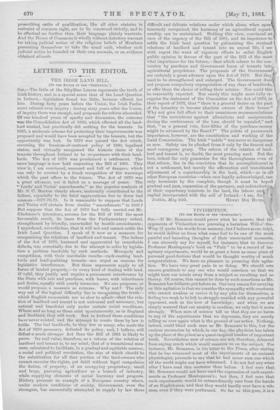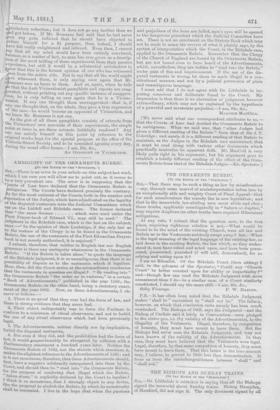VIVISECTION.
[TO Tits EDITOR OF TI119 "SPEOTITOR.1 Sin,—If Mr. Romance would prove what he asserts, that th opponents of Vivisection are pursuing a harmless Will-or ,the- Wisp (I quote his words from memory, but I believe accur..tely),. he would deliver us from what some feel to be one of the most painful and haunting thoughts of their unoccupied moments.. I can sincerely say for myself, for instance, that to discover Professor Mantegazza's book on "Pain" to be a record of im- aginary experiments, would be as great a boon as some piece of- personal good-fortune that would be thought worthy of much congratulation. We have no pleasure in pursuing this agita- tion. We have very great pain in so doing. We should owe sincere gratitude to any one who would convince us that we might turn our minds away from a subject so revolting and so thorny. Of course, this cannot be done by such assertions as Mr.. Roman es has hitherto put before us. Our very reason for carrying on this agitation is that we consider the sympathy with creatures who cannot awaken or revive it by any plea for themselves, a feeling too weak to be left to struggle unaided with any powerful opponent, such as the love of knowledge ; and when we are- simply assured that our anxiety is needless, we only feel it more- strongly. When men of science tell us that they see no harm in any of the experiments that we deprecate, they are merely telling us over again what is the ground of our action. Nothing,. indeed, could blind such men as Mr. Romaine; to this, but tho curious succession by which, in our day, the physicist has taken up the place of the priest as a quasi-inspired teacher of important truth. Nevertheless men of science are not, therefore, debarred. from saying much which would reassure us on the subject. For instance, Mr. Romance, in his letter to the Times, after stating that he has witnessed most of the experiments of an eminent physiologist, proceeds to say that ho had never seen one which all the world might not have witnessed. I do not feel any wiser after I have read this sentence than before. I feel sure that Mr. Romanes would not have used the expression of such experi- ments as Professor Mantegazza's ; but then, I feel sure that such experiments would be extraordinarily rare from the hands, of an Englishman, and that they would hardly ever have a wit- ness, evon if they were performed, So far as this goes, it is a tisfactory reflection ; but it does not go any further than we d got before. If Mr. Romanes had said that he bad never teen any pain inflicted that he should have objected to duo himself for a fit purpose, then, indeed, I should ave felt really enlightened and relieved. Even then, I cannot ay that all my mind would have been entirely convinced, ecause, as a matter of fact, no man has ever given us a descrip- ion of the most trifling of these experiments from their passive xperience, but still it would be a substantial satisfaction to 'j now that this is the honest opinion of one who has witnessed em from the active side. But to say that all the world might ."0 ve witnessed them, is only saying once again that Mr. omanes sees no harm in them. And so, again, when ho tells s that the Anti-Vivisectionist pamphlets and reports are exag- , Crated, without pointing out any specific instance of exaggera- ion, he is only telling us over again that he is a Vivisec- f tionist. lf any one thought them unexaggerated—that is, if any one thought that, on the whole, they gave a true expression of the case—he would become an opponent of Vivisection, and we know Mr. Romanes is not one.
As the gist of all these pamphlets consists of extracts from the Vivisectors' own accounts of their experiments, the simple point at issue is, are these extracts faithfully rendered P Any one can satisfy himself on this point by reference to the original works kept for the special purpose at the office of the Victoria-Street Society, and to be consulted (gratis) every day, ,luring the usual office hours.—I am, Sir, &c.,
AN OPPONENT OF VIVISECTION.



































 Previous page
Previous page